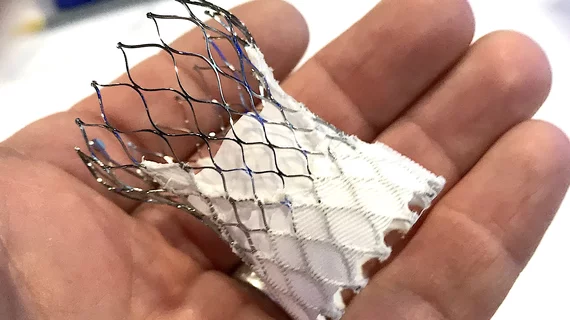Resheathing heart valves during TAVR does not increase risk of complications
Using the resheathing features found in newer self-expanding transcatheter heart valves (THVs) during transcatheter aortic valve replacement (TAVR) does not increase the risk of periprocedural complications, according to new research published in the Journal of the American Heart Association.[1]
These resheathing features represent one of many updates seen in the latest generation of self-expanding THVs. Citing concerns within the industry that these features could increase the risk of TAVR complications, the study’s authors performed a systematic review and meta-analysis of data from more than 4,500 TAVR patients.
Data was taken from seven different studies. The mean patient age was just shy of 81 years old, and 54% of patients were female.
Resheathing/repositioning was necessary in 30.5% of TAVR procedures included in the analysis. Medtronic’s Evolut and Abbott’s Portico THVs were the most common devices used when treating these patients. Any patients treated with Boston Scientific’s Lotus Valve were excluded from the group’s analysis.
There were no significant differences between patients who required resheathing and patients who did not. This included 30-day rates of mortality, stroke, coronary obstruction, major vascular complications, major bleeding events, acute kidney injury, device success, paravalvular leak and permanent pacemaker implantation.
In addition, the group added, one-year mortality was not impacted when patients required resheathing/repositioning.
“This analysis suggests that resheathing for THV repositioning during TAVR is associated with similar periprocedural risk of adverse outcomes in several patient‐important outcomes,” wrote first author Francesco Moroni, MD, a cardiologist with Pauley Heart Center at Virginia Commonwealth University, and colleagues. “These data support the safety of current self‐expanding THVs with resheathing/recapturability features.”
Related TAVR Content:
7 ways cath labs can work through the contrast media shortage without delays
COPD patients benefit from TAVR—but there are some significant risks to consider
TAVR vs. surgery among children and young adults with congenital heart disease
Late-breaking structural heart studies at TVT 2022 announced
Same-day discharge after TAVR is safe for low-risk patients, leads to considerable cost savings
Reference:

